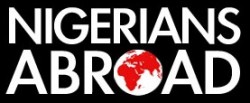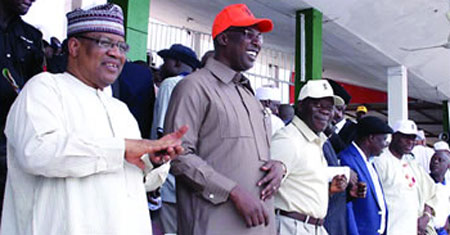Nigerian President Goodluck Jonathan promised thousands of his supporters on Saturday he would create jobs, improve infrastructure and give women a larger role in government if he wins elections in two weeks.
Addressing a crowd bussed into the capital Abuja for his final campaign rally, Jonathan pledged a rapid improvement in electricity supply in Africa’s most populous nation, which is beset by chronic power shortages, and a greater role for Nigerian companies in the OPEC member’s oil and gas industry.
“I will clear out any vested interests that stand in the way of rapid policy implementation and quick economic transformation,” Jonathan said, in a speech that was heavy on sweeping promises but light on detail.
Nigeria’s presidential election is due on April 9.
Large inflatable balloons of Jonathan dressed in his traditional kaftan floated over Eagle Square as state governors and officials from the ruling People’s Democratic Party (PDP) lined up to deliver speeches praising him and pledging loyalty.
Security forces set up metal detectors around the square and police helicopters buzzed overhead to try to control the crowds. A group of women fought over free PDP T-shirts and hats.
The PDP has dominated Nigerian politics since the end of military rule 12 years ago, winning every presidential race since then. It controls around two thirds of the 36 states and commands a strong majority in parliament.
Jonathan, the first president from the southern Niger Delta, is considered to be the front runner in the election, although his main challenger former military ruler Muhammadu Buhari, a northerner, is hoping to force a run-off.
Jonathan inherited the presidency when his predecessor, Umaru Yar’Adua, died last year and he is seeking what would have been Yar’Adua’s second term. Buhari is hoping to capitalise on northern resentment over his candidacy from voters who feel it deprives their region of another four years in power.
PLEDGES OF ALLEGIANCE
To win in the first round, Jonathan needs to secure 25 percent of the vote in at least two thirds of the states, or else he will face a run-off with his nearest rival.
Buhari — a disciplinarian who ruled between December 1983 and August 1985 and is best remembered for his “War Against Indiscipline”, a campaign against corruption — is expected to win strong support in parts of the north.
A poll published this week by the This Day newspaper carried out with global research group Ipsos put support for Jonathan at just over 60 percent, with Buhari on 22 percent.
For several hours, state governor after state governor, including from parts of the north, lined up to pledge allegiance to Jonathan at an event which laid bare how patronage rather than public service lies at the heart of Nigerian politics.
The governors, who rely on their share of federal oil revenues for their budgets, are expected to deliver support from their states for Jonathan at the presidential vote.
“Rest assured, this is a one-party state,” said Rivers state Governor Rotimi Amaechi, echoing similar pledges to deliver votes for Jonathan from his peers.
Jonathan dubbed the PDP “the only truly national party” but there is widespread resentment at its overriding dominance.
An opposition governorship candidate in the state of Akwa Ibom, on the edge of the Niger Delta, was charged with treason on Friday for alleged involvement in political violence.
“This is one of the ways the government is using state machinery to intimidate the opposition and it is not good for democracy,” said Thomas Akpan, spokesman for the opposition Action Congress of Nigeria in Akwa Ibom.
Nigerians are hoping this year’s poll will be an improvement on past elections, which observers said were not credible because of ballot-stuffing and fraud.
Nigeria holds a parliamentary poll on April 2, where the PDP is expected to lose some of its majority, and state governorship elections on April 16, a week after the presidential race when it is also expected to lose some of its regional strength.
-Reuters












